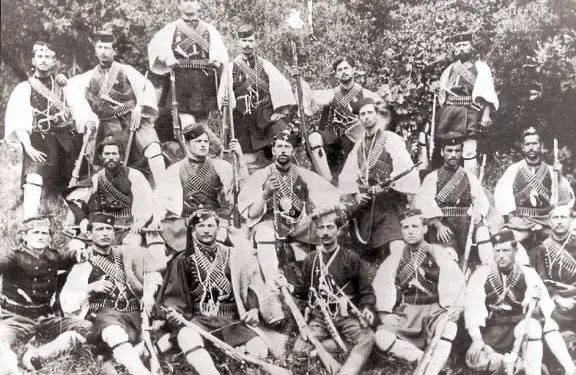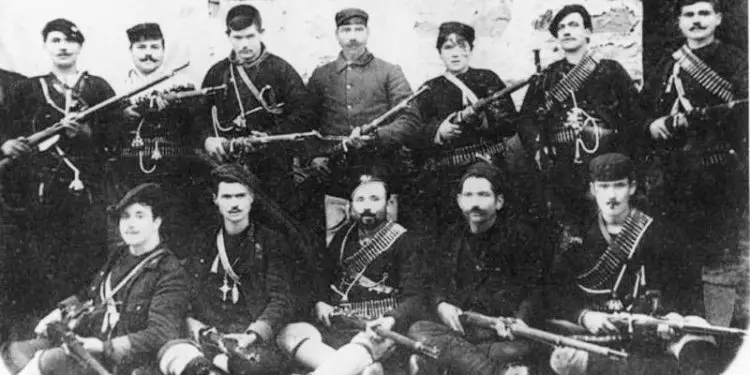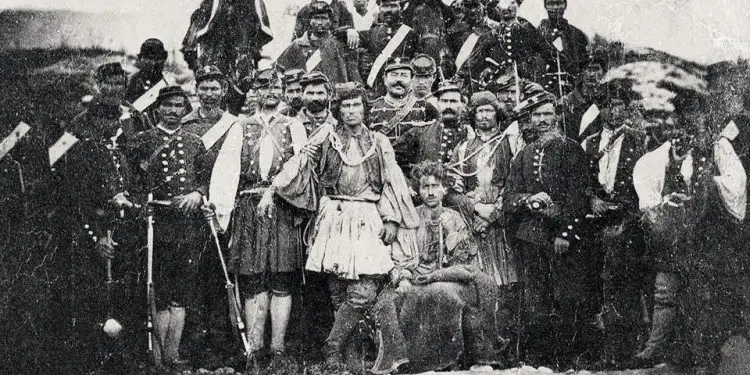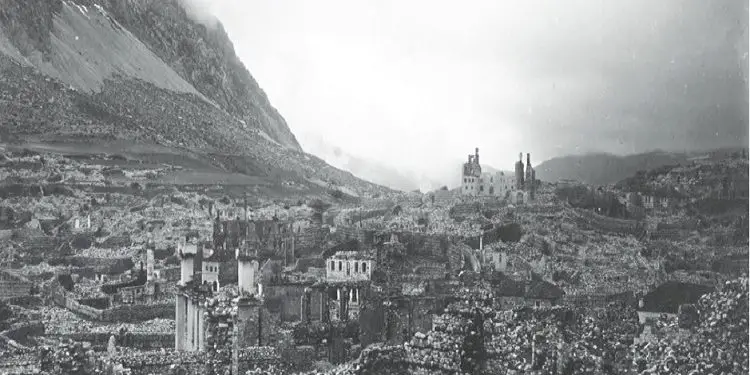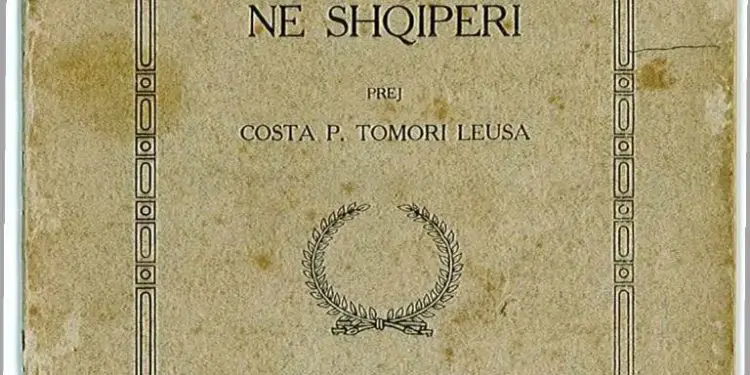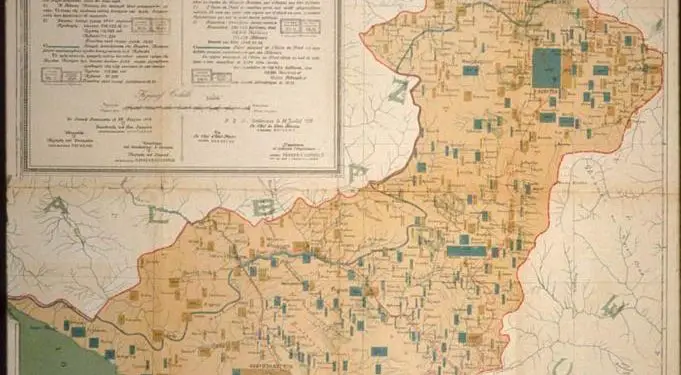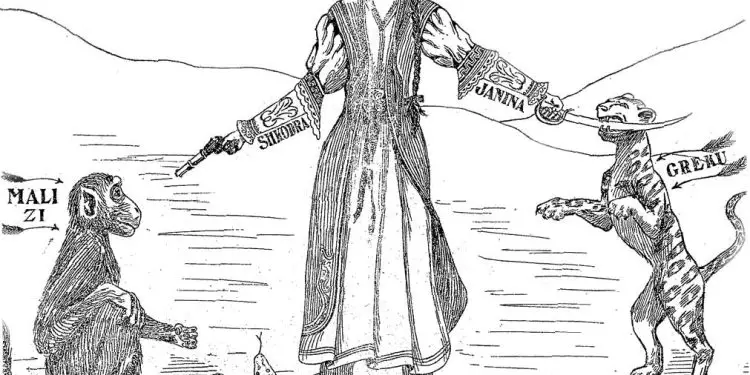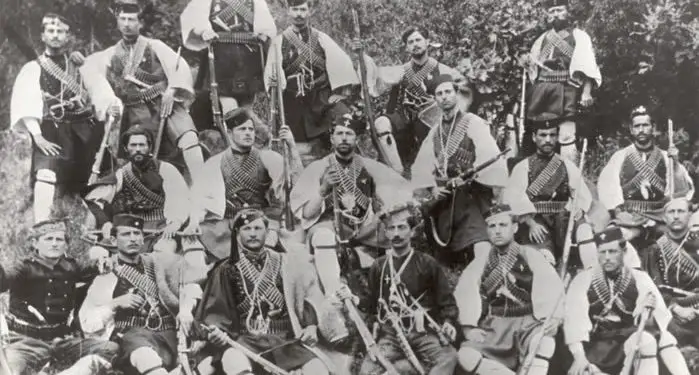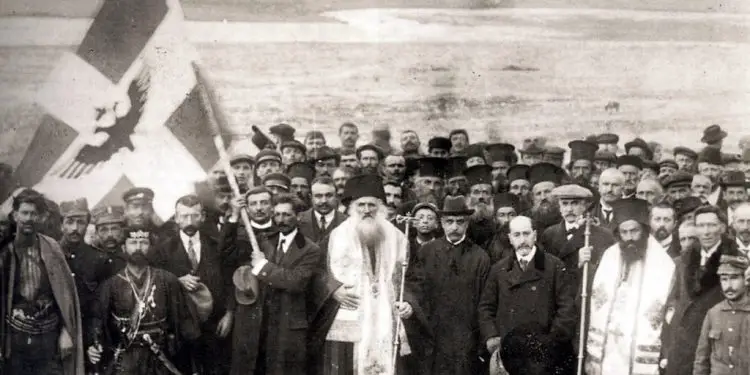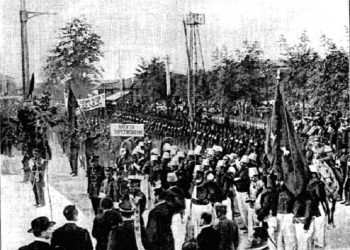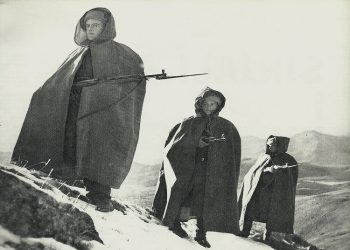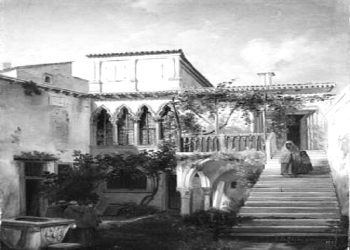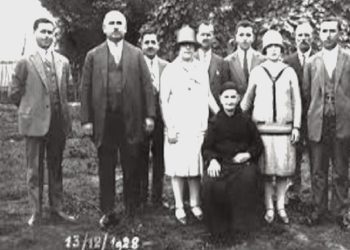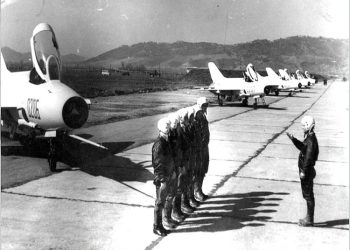From Costa Papa Tomorri
The fifth part
Memorie.al/ publishes the book “Greek Barbarians in South Albania” – in the years 1913 – 14, written by Kosta Papa Tomorri, who was an Albanian Orthodox priest, originally from Leusa e Përmet. As a witness of the Greek massacres during the First Balkan War, he wrote a book, or rather a volume, dedicating it to Mehmet bey Konica and it was published in 1917. Priest Kosta Papa Tomorri, was a witness of the time of the Greek attacks and barbarism of 1913-1914, who experienced the tragic events on the defenseless Albanian population in the South of the country, which he then described in that book. His evidence is shocking, also due to the fact that he was an accurate observer of those events and in his chronicles, illuminates many incidents and events that shed light on the barbarism of the Greek invaders. That book is a unique specimen, perhaps the only one, devoted to those events, from an eyewitness. Kosta Papa Tomorri’s book describes horrifying events, and testifies in detail, the tragic history of the inhabitants of those parts, where the author served in those years. The book is an accusation made by a priest and browsing its pages, we see that, among other things, he says: “Albanians! You, our sons, generation after generation, when you speak the word Greek, don’t forget the slaughter, burning and dishonor”! The priest gives this order.
You Albanians, you and your brother killed me, and I scattered a few of them. V.P
GREEK BARBARIANS IN ALBANIA
From
COSTA P. TOMORI LEUSA
JOURNAL PRESS
FRAMINGHAM, MASS
1917
IT COSTS 35C
MEHMET BE KONITZA TO THE DELEGATES OF THE ALBANIANS OF AMERICA WHO ARE TRYING TO SAVE ALBANIA FROM TOMORROW’S TROUBLE LIKE THE ONES IN THIS BOOK
I DEDICATE THIS WORK TO ONE OF HIS SOLDIERS
A flash, then night,
O beautiful Butterfly.
Continues from last issue
OFFENSIVE OF THE CURVES AGAINST THE PIZZA
The brave men of Kurvelesi were in Qaf’e Picari, they decided to launch an offensive against the Andars, after the folk song that says, “These boys of Kurvelesi / blow the square”. Indeed, they did so, and not only the men, but also the women, like Spartiatka, dueling with axes in their hands. Monday, April 22, when it was getting dark, Kurvëleshas set fire to the two-story houses and gave them to the Andars. The double-edged sword from both sides.
A white-haired Nivicjot old man, with a shaggy yatagan, had come out in front of the trumpet and was going forward, giving courage to the boys. The Andars were braving manfully, but the Kurveleshas are giving you the upper hand. The Andars broke through to the Monastery of Chepos, where they tried to face the Albanians. But the Albanians did not suffer bullets, but forward on them. Here, 160 vehtas were bitten by the Andars, and they were broken by the Chepos Monastery. The Albanians were following them like goats and deer all the way to Oviro, 2 hours from Gjinokastra, where the Albanians stayed. When Zografua found out that the Albanians had taken refuge in Oviro, he took it seriously, I don’t think he was setting up the Government and pushed it to Delvina.
Such an offensive was carried out by the Kolonjars against the Andars all that day, who were defeated. The Albanians therefore came forward from two sides. From Gjinokastra and from Cologne. Zographed, seeing that the Albanians were winning from two sides, only the middle had been left behind, that is, the Përmet district, you were afraid that the Albanians would not make a strategy, to close the Përmet and the Albanians of the Kolonje district, with the Albanians of the Gjinokastra district. , in the middle of the bridges and thus to close the andars of Përmet. That’s why I telegraphed Commander Përmet, to gather the crew and go to the middle of the bridges.
As soon as this news reached Përmet, the locals thought that they would all get up to the middle of the bridges. Commander Përmet warns all the troops to flee. All the villagers lifted the child to the middle of the fields. The Andars gave orders to set fire to all the villages of Krështera, so that the Albanians would find only ruins. The fire among the Christians started from Frashëri. The commander of the troops of Frashër, I call all the troops to gather in the square of the church. He ordered the Christians of Frashëri to take the child, leave their homes and come to Përmet. The poor Frashëllinj left with their clothes and made their way to Përmet.
After the troops gathered in the Church square. The commander tells you the order he received and told you to set fire to the Christian houses. So, the Andars were released with pine trees in their hands and set fire to all the houses, and as soon as they finished Frashër, they would occupy the other villages one after the other. Zografua was crying for help because otherwise they would be lost, then the Greek governess ordered Mother General Papulla, who was in Jorgucat, to send them help. Papulla himself left with his army for Gjinokastra, and I sent Colonel Ciruli to Përmet, to pacify the country and stop the fire of the Christian villagers.
When Ciruli arrived in Përmet, I sent a mandarin to Frashër to cease fire, but when the mandarin arrived in Frashër, Frashër was finished. Hariti only the other villagers. The children of all the villages of the Përmet district gathered in Përmet. The squares of Përmet were filled with children. Many children were kidnapped by the Andars and many women were dishonored. How did you help the Gjirokastra district, on the fourth day they launched an offensive against the Albanians, who were defeated after a day of fighting? The help you gave to the Andars was great and two cannons were renewing the positions of the Albanians.
The Albanians had nothing to do, except to go. The Andars were following them and, burning the villagers they found in front of them, they drove the Andars into Hormovë, gathered all the people of the village, who numbered 160 people, and drove them to Kodër. Hormova was set on fire. They went to Luzat, set fire to Tepelena, opened the shops that were without owners, took the loot and set it on fire, as they burned Tepelena, they went further down and burned these villages: Bênçë, Velgjot, Turan, Dukaj, Memalias and Zaljari. Here they made money.
MASSACRES OF THE HORMOVITES
We said that the Hormovites pierced them in Kodër. When the troops of Gjinokastra were defeated in Zalari, Colonel Zira, returned them to Kodër where he had left the Hormovites and decided to put an end to the lives of the Hormovites. He divided the Hormovites into three gangs of 60 souls, tied arm to arm and placed them in three places, then he chose from his body 36 of the best bayonets and ordered them to put bayonets on the two-faced.
As they put the bayonets, he told you to separate into three gangs of 12 souls and come to the place where the Hormovites were and kill them with bayonets. The Andars did as you and the Commander ordered. They went to where the Hormovites were and took turns to kill them with bayonets…! The poor Hormovites, tied hand and foot, were being mercilessly dispossessed by the Katilis. This tragic scene took place right in the village church, when everyone had finished eating, one of the villagers threw it. This was the tragic end of the Hormovites.
ARMISTICE
On May 12, an armistice was signed between Albanians and Andars. The reason for this armistice was that a Conference would be held in Corfu, by the Consuls of the Great Powers and the Delegates that would be sent by the Albanian governor and by Zografua. The Dutch who were in Kilcyre, sent an officer with a gendarme to Përmet, to the Mavroidhi Greek Command, and it was agreed that they would mark a neutral line until the Corfu Conference was over. Mavroidhiu got up and went to Këlcyre, where he joined the Dutchman and marked the neutral line with white flags.
The Albanian government sends delegates to Corfu, Colonel Thomson and Medi Bey Frashër, on behalf of the insurgents, who were killed by Zografua with Dhuli. This Conference lasted a week and ended by giving Zografo some privileges, for those years that made the Uprising. Zografua also brought Korça inside, but here he found opposition from Medih Bey, who said: “Why are you asking for privileges for Korça, when Korça did not declare an uprising”. Zografua replied: “I have a duty to teach Christians”. Finally, Korça was also accepted. The privileges they gave to Zografo were the following:
These countries that declared the Uprising, let him be known as king, the King of Albania, and let the Albanian flag fly wherever he wants.
The civil servants and the gendarmerie were natives, Christians and Muslims, and the Albanian government had no right to exchange the civil servants, to return the Tosks to Gegëri and the Gegërs to Toskëri.
The income of these vices, after paying the money that would be missing for these vices, the rest would be sent to the general treasury.
Albanian should be the official language in courts and schools. Greek schools would remain as they were, if Albanian were also taught as the official language.
The churches should remain as they were, in the Greek language.
The Albanians had nothing to do, except to go. The Andars were following them and, burning the villagers they found in front of them, they drove the Andars into Hormovë, gathered all the people of the village, who numbered 160 people, and drove them to Kodër. Hormova was set on fire. They went to Luzat, set fire to Tepelena, opened the shops that were without owners, took the loot and set it on fire, as they burned Tepelena, they went further down and burned these villages: Bênçë, Velgjot, Turan, Dukaj, Memalias and Zaljari. Here they made money.
MASSACRES OF THE HORMOVITES
We said that the Hormovites pierced them in Kodër. When the troops of Gjinokastra were defeated in Zalari, Colonel Zira, returned them to Kodër where he had left the Hormovites and decided to put an end to the lives of the Hormovites. He divided the Hormovites into three gangs of 60 souls, tied arm to arm and placed them in three places, then he chose from his body 36 of the best bayonets and ordered them to put bayonets on the two-faced.
As they put the bayonets, he told you to separate into three gangs of 12 souls and come to the place where the Hormovites were and kill them with bayonets. The Andars did as you and the Commander ordered. They went to where the Hormovites were and took turns to kill them with bayonets…! The poor Hormovites, tied hand and foot, were being mercilessly dispossessed by the Katilis. This tragic scene took place right in the village church, when everyone had finished eating, one of the villagers threw it. This was the tragic end of the Hormovites.
ARMISTICE
On May 12, an armistice was signed between Albanians and Andars. The reason for this armistice was that a Conference would be held in Corfu, by the Consuls of the Great Powers and the Delegates that would be sent by the Albanian governor and by Zografua. The Dutch who were in Kilcyre, sent an officer with a gendarme to Përmet, to the Mavroidhi Greek Command, and it was agreed that they would mark a neutral line until the Corfu Conference was over. Mavroidhiu got up and went to Këlcyre, where he joined the Dutchman and marked the neutral line with white flags.
The Albanian government sends delegates to Corfu, Colonel Thomson and Medi Bey Frashër, on behalf of the insurgents, who were killed by Zografua with Dhuli. This Conference lasted a week and ended by giving Zografo some privileges, for those years that made the Uprising. Zografua also brought Korça inside, but here he found opposition from Medih Bey, who said: “Why are you asking for privileges for Korça, when Korça did not declare an uprising”. Zografua replied: “I have a duty to teach Christians”. Finally, Korça was also accepted. The privileges they gave to Zografo were the following:
These countries that declared the Uprising, let him be known as king, the King of Albania, and let the Albanian flag fly wherever he wants.
The civil servants and the gendarmerie were natives, Christians and Muslims, and the Albanian government had no right to exchange the civil servants, to return the Tosks to Gegëri and the Gegërs to Toskëri.
The income of these vices, after paying the money that would be missing for these vices, the rest would be sent to the general treasury.
Albanian should be the official language in courts and schools. Greek schools would remain as they were, if Albanian were also taught as the official language.
The churches should remain as they were, in the Greek language.
As we said above that the Andars were making preparations to launch an offensive against Këlcyra and Çepan, they marked the day which was Monday, May 29. The plan of the offensive was as follows: Fjorgakaqi, Jorgollaqi, Qiro Vaso, in Miçan to fall to Backa. Capedan Farmaqi in Malint, to fall to Qafa Rogut, Capedan Niko, Aristidhi and the body of Kocifaq in Qarishte, against Muzhaka. Captain Psaroj, Pope Jani, Captain Zerva, Captain Kollovoj, the body of Karaxhaqjt, in Fratar, Mavrovoidhi in Breshan, with all the cannon. The offensive started at 2 am in Qarishte. Dyfek encountered the entire line, the cannon from Brezhan, was continuously bombarding Këlcyra, the other cannon from Miçan, was bombarding Backa, Qaristesh’s troops attacked the positions held by the Albanians.
The morning had not spread the darkness of the night. Here the Andars and Albanians rioted together, the forest was dense, the wind was deep… and so no one could hear the tjatrin, as it became a little white, the Albanians gathered and fled and the Andars fell behind you in Qarishte, 4 Andars were killed and wounded. How the Albanians of Qarishte were broken, they were broken and those of Këlcyra were broken and those of Backa were broken, they entered Backa by fire, Çorovoda by fire. The body of Sevran burned in Rrog, in fire, in Muzhake, in fire, in Çepan, in fire, in Zhepove, in fire, in Kajcë, in fire, in Toskesh, in fire, in Vinokash, in fire, in Ballabanas, in fire, in Bubez, in fire, in Mazhan. The troops of Gjinokastra stormed Dragot, Beçishti, Meçguran, and here they died.
The spoils that the Andar took in these villages have no account as well as living things. 300 loads of only copper left in Ioannina, a living thing with thousands of heads, they were going to Greece. In Backa, 30 souls were slaughtered, women and babies who did not dare to go to Zhepove, 15 women with cradles in their arms were taken and slaughtered with all the babies they had. The Albanians were demoralized that on the one hand the advances of Esat, who took Berat, so the Albanians, finding themselves between the two fires, were divided and could no longer maintain a chain.
The Albanian Mohammedans who went with all their children to Berat, removed the olive tree, they had no place to put the child, and on the other hand, the army of Esat was tormented by these reasons, most of them decided to hide in the ruins of those who became members. They decide to forgive those who burned them, who slaughtered them, who disrespected them. So many children returned. Over 300 children came to Vinokash, Toskesh, Kajce and Zhepove. Over 400 children came to Skrapar. If they black, what they removed from the members, because on one side they gave their word that they would not suffer gisendi and on the other side they worked the evillest.
A Greek named Koqino from Lefkada, Greece, with 3 other friends, left from Çepan and went to the village of Rovicë, after the men of the village ate and drank and tied up, they liked a couple of mules they had, they took them. They both liked a muar maid and that and they left for Çepan. When they came near Çepan to rest a little, they decided to release the men they had taken, because since they were close to Çepan, they had no fear that the men of the village would do anything to them.
So, the men let them go. When the men were released, they didn’t go to their village, they went to another village that was nearby, and did they let you know what happened. The men of that village didn’t hesitate, each of them took the weapon they had and fought to take these beauties to wherever they needed to go. The Andars were having fun with that poor maid they had, they started to go when they reached the place they had occupied, the bullets came like hail. One of them was wounded and had to go into the forest, the other two picked up a stone and were running. When the Muslims saw that they could not kill them because they had taken a strong position, a couple of them came and took their arms and from there they gave them a bullet and left them in the position.
Then they approached, took the weapons, the mules, the wretched servant and went to their village. In the village of Rog, Rakipi was with all the children. Rakipi had a maid for 12 years. One day some friends left to have fun with the little maid. Poor Rakip screamed. The Andars killed Rakip and his child…! I escaped from the body that was in Çepan and joined another body under the command of a Greek officer named Nikollopoulos.
This officer was a very good man, because he had not been Greek since the years of Albania, from Himara. I developed a close friendship with this officer, who put me in charge of his body’s midwives. This body was staying in Përmet, after a few days the commander-in-chief decided to send this body to Toskës. After the order, we got up from Përmet and headed for Toskës. We went to Toskës where we found a house at the end of the village on a bank, which fortunately had not burned down.
We lived in this house to be young, the soldiers of this corps settled on the bank of Vinokoshi. There were 3 other bodies in this line. Kollovoj’s body, Fjogollaq’s body and Zerva’s body, all three of these bodies were stationed in Qafë te Vendreshi, in these villages, about 200 children came to be prayed for. They also had 600 cattle. The commanders of these troops promised these women that they would not suffer any harm. The poor came and made a hut to hide their child.
Not many days passed after the forgiveness of these children. The members of these troops, trying to persuade the blessed child, came to their huts and wanted to honor him. The poor women came for days and cried, for this reason I begged my officer to protect the poor child. I spoke with him and asked him to officially accept the protection of children from the Commander-in-Chief, so he got up and went to Permet to officially accept it. I went with him. In our body was a Greek Magnate, named Arnaut.
This beauty on the occasion of our escape to Përmet. Vate went to the house of Amet from Vinokeshi, he went inside allegedly to look for a weapon, where he couldn’t find any, he only found a Greek cobra, he tied up Amet. Amet had a good horse which he took from him, he also took Amet and went with him and some other horses, he also took two others because they had weapons, how he tied these three well, to the Andars and told you to take them out of the village and kill them. The Andars took them and pierced them all the way to Ballabanas, and there they gave you a bullet and left them alone.
My most trusted officer in Permet, went to the court and made it known to the Greek governor, who was Mr. Manduvallo, and I asked him to give him the protection of the children in writing, who gave it, how he received the writing we left for Toskës. When we arrived at Ballabanas, we found the three Muslims dead in the middle of the road. When we got home, we asked about those killed, with these words Amet’s mother came crying and begged us for her son, to let him go because the poor thing didn’t know that Amet was lying in the middle of the road. The officer tells me what he is looking for and I told him that it is the mother of Amet, who we found murdered. The officer got very angry and told me to tell him to go, that we will release the boy in a few days, poor mother, I’m going. After this, Arnaut took his horse and went to Përmet and never returned to Toskës.
Some members of Zerva’s body went to the village of Vendresh and captured 7 men and a boy, because they had allegedly seen the Albanians entering Vendresh, tied all 8 of them to Vendresh’s neck and killed them there with queue. When the boy’s house arrived, the boy was not afraid and said; what do you want, you barbarians, by slaughtering the Albanians to extinguish them and one Albanian as long as he remains, he will not be left alone, long live the King of Albania. Before finishing this word, the cat’s hand hit him with a knife in the back of the neck and the poor boy reached out and with the words, long live the King…!
The Albanians who were divided and no longer held borders, when they learned of this event, they all gathered in Vendresh and decided to make an offensive for the last time. It was Tuesday at 12 o’clock. The Albanians attacked Qafës Vendresht, where 300 Andars were encamped. The double-edged sword was cut from both sides. The Albanians attacked them so much that they forced the Andars to leave the country and followed them to Qafë Kajce. Dyfeku took the whole line, the Andars all broke and occupied Këlcyra that night. When the Commander of Përmet learned of the offensive of the Albanians, he rose from Përmet with his army and went to Këlcyra and that night, we decided that the next day they would launch an offensive against the Albanians.
The next day, they fired both cannons at Topoja and gave the order to bombard the Kajca Pass without ceasing, the whole line was met. The Albanians were forced to leave and the Andars were coming to occupy the places they had before. The forgiven child had taken the woods, and the whole child was slaughtered by the Andars. This time, the Andars defeated Toskëria, because they went to the black waters and burned all the villages that were Rotul, occupied 180 villages in the river of Skrapar and slaughtered them. The Greek government, on the occasion of the European war that broke out, sent the regular army to Ypres, to bring peace…!
With the arrival of the regular army under the command of Mr. Populla, he gathered the members, took their weapons and sent them to the houses…! Albanians! They were burned, slaughtered, disrespected, destroyed, for what? From our non-union. Religious fanaticism brought us all these miseries. So, I pray to God, that these sufferings become lessons for us and all of us as brothers with one mind and one soul, strive for the happiness of our homeland. Down with religious fanaticism. Long live the liberals…! Memorie.al
Don’t even look at Kisha Zhamia
Albania’s religion is Albania. (V.P.)




